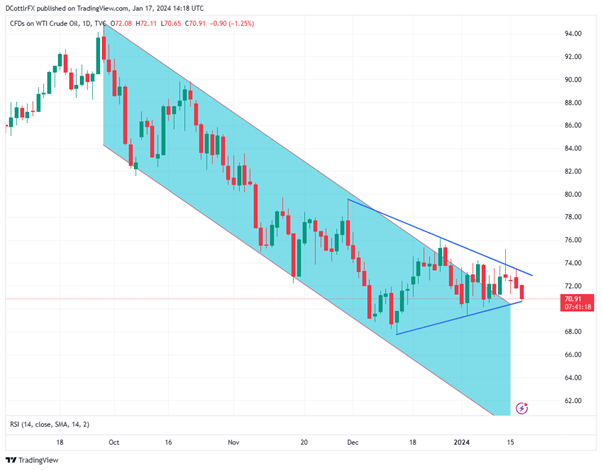Crude Oil Price, Analysis and Charts
- Crude prices shed more than a dollar after the China data
- The market faces multiple uncertainties, as its pricing reflects
- Near-term falls look more likely.
Crude oil prices fell by more than a dollar per barrel on Wednesday as China’s growth data disappointed, raising more worries about end-demand for energy.
The world’s number two economy expanded by an annualized 5.2% in the final quarter of 2023. This was only a tick below expectations but, given weak rises in household income and clear pressure on consumer sentiment, that was enough to hit oil prices.
The United States West Texas Intermediate benchmark slid by $1.35, with a fall of similar magnitude hitting international bellwether Brent.
The crude oil market faces a period of unusual fundamental uncertainty, even by its own standards, which is unsurprisingly also reflected in the technical picture.
While there are some obvious tailwinds for prices, some of them come with caveats that make the picture hard to read. On the supply side, major producers in the Organization of Petroleum Exporting Countries and its allies are likely to extend and perhaps even increase their production cuts out into this new year.
However, even if they do so, signs of surging oil supply from outside this powerful group may blunt the ability of its cuts to support prices. For example, US domestic oil production soared to record levels in late 2023, helped by advances in shale oil drilling in the key Permian Basin region. Other producers such as Guyana have also seen output rise. In short, the crude market is no longer OPEC’s to command as it has been in the past.
Conflict in Ukraine and Gaza will only add to uncertainties for as long as it rages, with the oil market paying particular attention to the current attacks on shipping from Yemeni rebels. Its tankers remain in the firing line and, unlike the freight carriers, cannot simply avoid this crucial oil-producing region even if those headed for Europe can be expensively diverted around Africa.
Similarly, on the demand side, there’s some hope that the US, at least, will recover sharply if interest rates come down as expected. But China’s economy remains constrained, as the latest data underline. The 6%-plus growth rates of the pre-pandemic era look unlikely to return any time soon.
Recommended by David Cottle
How to Trade Oil
Crude Oil Prices Technical Analysis
WTI Daily Chart Compiled using TradingView
Crude prices have been confined to a narrowing daily range, which is understandable given the fundamental backdrop.
The pennant formation on the daily chart notable last week remains in place despite a brief intraday probe above it on January 24. The pennant is known as a continuation pattern which means that the market is likely to resume its previous behavior once the formation breaks. This would be bad news for bulls, as there has been a strong downtrend in place since September.
For now, the pennant offers resistance at $73.20 and support at $70.34. There is more pressure on the downside now as Wednesday’s falls have seen previous support around the $72 handle taken out quite convincingly. Further slides will see the $71.08 region come into focus. That was December 12’s intraday low and also the lowest point for the market since late June 2023.
| Change in | Longs | Shorts | OI |
| Daily | -4% | 13% | -2% |
| Weekly | 0% | 4% | 0% |
The oil market’s next data focus will be on US stockpile levels for the week ending January 12. They’ll be released by the Energy Information Administration on Thursday, and a 2.4 million barrel crude drawdown is expected.
–By David Cottle for DailyFX

